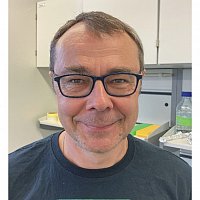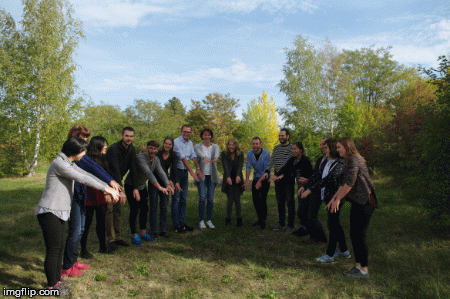Dr. Stanislav Isayenkov

Kontakt
Dr. Stanislav Isayenkov
Philipp Schwartz Fellow (Philipp-Schwartz-Stipendiat)
Martin-Luther-Universität
Halle-Wittenberg
Betty-Heimann-Straße 3
Raum 1.27
06120 Halle (Saale)
Telefon: 0345 55 22423
Telefax: 0345 55 27113
stan.isayenkov@landw.uni-halle.de
Research
I previously led the Department at the Institute of Food Biotechnology and Genomics, National Academy of Sciences of Ukraine, in Kyiv. Unfortunately, the devastating war in Ukraine, initiated by Russia, has made it impossible to continue research and experimental work due to constant power outages, electricity shortages, lack of essential equipment, and a shortage of experts, along with daily air raid alarms. Thanks to the Philipp Schwartz Fellowship from the Alexander von Humboldt Foundation, I have been able to continue my research at the Institute of Agricultural and Nutritional Sciences, Martin Luther University Halle-Wittenberg, Germany.
Throughout my research career, I have had excellent opportunities to live and study in Germany, the United Kingdom, the Czech Republic, and Ukraine. As a scientist, I am deeply passionate about plant molecular biology, physiology, bioengineering, and functional genomics. My expertise spans various topics, including molecular evolution, molecular biotechnology, and plant biofortification. Over time, I have gained a profound understanding of how modern agricultural productivity is increasingly affected by environmental stresses, such as salinity, drought, and soil degradation. Consequently, my primary scientific interests lie in plant mineral nutrition, membrane transport of ions, the mechanisms of drought and salinity stress tolerance, the functions of plant vacuoles, and the adaptive strategies used by halophytic crop relatives to thrive in high-salinity environments.
My current research focuses on understanding the adaptation mechanisms of wild barley relatives to extreme environmental conditions, including salinity and drought. The goal is to translate this knowledge into breeding programs and plant biotechnology to develop highly resilient crop cultivars. Additionally, I am interested in studying ion transporters and how they contribute to plant mineral nutrition and stress tolerance. Currently, we are working on the functional characterization of salt-specific endomembrane transporters isolated from the halophytic barley Hordeum marinum.
The aim of my research is to uncover novel structural, physiological, and biochemical mechanisms that underlie salt-stress adaptation in halophytic barley relatives, with the ultimate goal of applying this knowledge to plant biotechnology and breeding programs to develop new salt-tolerant crops. Moreover, isolating and characterizing stress-specific ion transporters from halophytic crop relatives will help us understand their physiological roles in plants and how they might contribute to enhancing tolerance to environmental stresses. I strongly believe that my research will aid in the development of new, agronomically successful crops suited to the challenges of the future.
Together with my colleagues from the Plant Nutrition Laboratory, I can focus on the mechanisms of plant stress tolerance in response to growing climate challenges. I also welcome interested students to join our research on plant membrane transport and stress resilience at the Institute of Agricultural and Nutritional Sciences, Martin Luther University Halle-Wittenberg.
Publications
Dabravolski SA, Isayenkov SV (2024). The evolution of auxin-binding Protein 1. In: Bioinformatics for Plant Research and Crop Breeding, Jen-Tsung Chen (Ed.). Willey, p. 391-412.
Dabravolski SA, Isayenkov SV (2024). The role of plant ubiquitin-like modifiers in the formation of salt stress tolerance. Plants 13, 1468.
Dabravolski SA, Isayenkov SV (2024). The physiological and molecular mechanisms of silicon action in salt stress amelioration. Plants 13, 525.
Dabravolski SA, Isayenkov SV (2023). The recent updates on ALMT transporter's physiology, regulation and molecular evolution in plants. Plants 12, 3167.
Dabravolski SA, Isayenkov SV (2023). The role of anthocyanins in plant tolerance to drought and salt stresses. Plants 12, 2558.
Dabravolski S A., Isayenkov SV (2023). The regulation of plant cell wall organisation under salt stress. Frontiers in Plant Science 14, 1118313.
Isayenkov SV (2023). Wild Barley Relatives - Potential Donors of Salinity Tolerance for Cereal Crops. In: Multiple Abiotic Stress Tolerances in Higher Plants: Addressing the Growing Challenges (1st ed.). Gupta NK, Shavrukov Y, Singhal RK, Borisjuk N (Eds.). CRC Press. p. 75-90.
Dabravolski SA, Isayenkov SV (2023). The role of the γ-aminobutyric acid (GABA) in plant salt stress tolerance. Horticulturae 9, 230.
Dabravolski SA, Isayenkov SV (2023). The role of histidine kinase signalling in response to salt stress. Plant and Soil, doi:10.1007/s11104-023-05881-3
Dabravolski SA, Isayenkov SV (2022). Metabolites facilitating adaptation of desert cyanobacteria to extremely arid environments. Plants 11, 3225.
Dabravolski SA, Isayenkov SV (2022). Evolution of the membrane transport protein domain. International Journal of Molecular Sciences 23, 8094.
Dabravolski SA, Isayenkov SV (2022). Recent updates on the physiology and evolution of plant TPK/KCO3 channels. Functional Plant Biology 10.1071/FP22117.
Dabravolski SA, Isayenkov SV (2021). Evolution of the cytokinin dehydrogenase (CKX) domain. Journal of Molecular Evolution doi:10.1007/s00239-021-10035-z
Dabravolski SA, Isayenkov SV (2021). New insights into plant TPK ion channels evolution. Plants 10, 2328.
Nestrerenko EO, Krasnoperova OE, Isayenkov SV (2021). Potassium transport systems and their role in stress response, plant growth and development. Cytology and Genetics 55, 63–79.
Dabravolski SA, Isayenkov SV (2021). Evolution of plant Na+ P-Type ATPases: from saline environments to land colonization. Plants 10, 221.
Isayenkov S, Hilo A, Rizzo P, Tandron Moya YA, Rolletschek H, Borisjuk L, Radchuk V (2020). Adaptation strategies of halophytic barley Hordeum marinum ssp. marinum to high salinity and osmotic stress. International Journal of Molecular Sciences 21, 9019.
Isayenkov SV, Dabravolski SA, Pan T, Shabala S (2020). Phylogenetic diversity and physiological roles of plant monovalent cation/H+ antiporters. Frontiers in Plant Science 11, 573564.
Isayenkov SV (2020). Strategies for engineering of plant salinity tolerance. In: Research Advances in Plant Biotechnology, Blume YaB (Ed.), Nova Science Publishers, pp. 159-205. ISBN: 978-1-53616-432-9
Kvasko AY, Isayenkov SV, Dmytruk KV, Sibirny AA, Blume YaB, Yemets AI (2020). Obtaining wheat (Triticum aestivum L.) lines with yeast genes for trehalose biosynthesis. Cytology and Genetics 54, 283–292.
Krasnoperova OE, Goriunova II, Isayenkov SV, Karpov PA, Blume YaB, Yemets AI (2019). Potential involvement of KIN10 and KIN11 catalytic subunits of the SnRK1 protein kinase complexes in the regulation of Arabidopsis γ-Tubulin. Cytology and Genetics 53, 349–356.
Isayenkov SV (2019). Genetic sources for the development of salt tolerance in crops. Plant Growth Regulation 89, 1–17.
Krasnoperova OE, Buy DD, Goryunova II, Isayenkov SV, Karpov PA, Blume YaB, Yemets AI (2019). The potential role of SnRK1 protein kinases in the regulation of cell division in Arabidopsis thaliana. Cytology and Genetics 53, 3–11.
Isayenkov SV, Maathuis FJM (2019). Plant salinity stress: many unanswered questions remain. Frontiers in Plant Science 10, 80.
Demidchik V, Shabala S, Isayenkov SV, Cuin TA, Pottosin I (2018). Calcium transport across plant membranes: mechanisms and functions. New Phytologist 220, 49-69.
Karpov PA, Novozhylov DO, Isayenkov SV, Blume YaB (2018). Motif-based prediction of plant tubulin phosphorylation sites associated with calcium-dependent protein kinases in Arabidopsis thaliana. Cytology and Genetics 52, 428-439.
Karpov PA, Rayevsky AV, Krasnoperova EE, Isayenkov SV, Yemets AI, Blume YaB (2017). Protein kinase KIN10 from Arabidopsis thaliana as a potential regulator of primary microtubule nucleation centres in plants. Cytology and Genetics 51, 415–421.
Krasnoperova EE, Isayenkov SV, Yemets AI, Blume YaB (2016). Influence of protein kinase KIN10 gene expression on root phenotype of Arabidopsis thaliana root system under the condition of energy stress. Cytology and Genetics 50, 215-220.
Isayenkov SV, Maathuis FJM (2016). Construction and applications of a mycorrhizal arbuscular specific cDNA library. Cytology and Genetics 50, 79-88.
Sekan AS, Isayenkov SV, Blume YaB (2015). Development of marker-free transformants by site-specific recombinases. Cytology and Genetics 49, 397-407.
Isayenkov SV, Maathuis FJM (2015). The expression of rice vacuolar TPK channels genes restores potassium uptake in E. coli mutant strain LB2003. Cytology and Genetics 49, 1–5.
Isayenkov SV, Sekan AS, Sorochinsky BV, Blume YaB (2015). Molecular aspects of endosomal cellular transport. Cytology and Genetics 49, 192–205.
Isayenkov SV (2014). Plant vacuoles: physiological roles and mechanisms of vacuolar sorting and vesicular trafficking. Cytology and Genetics 48, 127–137.
Radchuk V, Pirko Ya, Isayenkov SV, Yemets A, Blume YaB (2014). cDNA library construction from meristematic tissue of finger millet panicle. Cytology and Genetics 48, 273–278.
Isayenkov SV, Maathuis FJM (2013). Arabidopsis thaliana vacuolar TPK channels form functional K+ uptake pathways in Escherichia coli. Plant Signaling and Behavior 8, e24665.
Isayenkov SV (2012). Physiological and molecular aspects of salt stress in plants. Cytology and Genetics 46, 302–318.
Ali W, Isner JC, Isayenkov SV, Liu W, Zhao FJ, Maathuis FJM (2012). Heterologous expression of the yeast arsenite efflux system ACR3 improves Arabidopsis thaliana tolerance to arsenic stress. New Phytologist 194, 716-723.
Isayenkov SV, Isner JC, Maathuis FJM (2011). Membrane localisation diversity of TPK channels and their physiological role. Plant Signaling and Behavior 6, 1201-1204.
Mian A, Oomen RJ, Isayenkov SV, Sentenac H, Maathuis FJM, Véry AA (2011). Over-expression of an Na+- and K+- permeable HKT transporter in barley improves salt tolerance. The Plant Journal 68, 468-479.
Isayenkov SV, Isner JC, Maathuis FJM (2011). Rice two-pore K+ channels are expressed in different types of vacuoles. The Plant Cell 23, 756-768.
Isayenkov SV, Isner JC, Maathuis FJM (2010). Vacuolar ion channels: roles in plant nutrition and signaling. FEBS Letters 584, 1982-1988.
Ali W, Isayenkov SV, Zhao FJ, Maathuis FJM (2009). Arsenite transport in plants. Cellular and Molecular Life Sciences 66, 2329-2339.
Grunwald U, Guo W, Fischer K, Isayenkov SV, Ludwig-Müller J, Hause B, Yan X, Küster H, Franken P (2009). Overlapping expression patterns and differential transcript levels of phosphate transporter genes in arbuscular mycorrhizal, Pi-fertilised and phytohormone-treated Medicago truncatula roots. Planta 229, 1023-1034.
Isayenkov SV, Maathuis FJM (2008). The Arabidopsis thaliana aquaglyceroporin AtNIP7;1 is a pathway for arsenite uptake. FEBS Letters 582, 1625-1628.
Gobert A, Isayenkov SV, Voelker C, Czempinski K, Maathuis FJM (2007). The two-pore channel TPK1 gene encodes the vacuolar K+ conductance and plays a role in K+ homeostasis. Proceedings of the National Academy of Sciences of the USA 104, 10726-10731.
Hause B, Mrosk C, Isayenkov SV, Strack D (2007). Jasmonates in arbuscular mycorrhizal interactions. Phytochemistry 68, 101-110.
Isayenkov SV, Stenzel I, Mrosk C, Strack D, Hause B (2005). Suppression of allene oxide cyclase in hairy roots of Medicago truncatula reduces jasmonate levels and degree of mycorrhization with Glomus intraradices. Plant Physiology 139, 1401-1410.
Isayenkov SV, Fester T, Hause B (2004). Rapid determination of fungal colonisation and arbuscule formation in roots of Medicago truncatula using Real-time (RT) PCR. Journal of Plant Physiology 161, 1379-1383.
CV
| since 2023 | Philipp Schwartz Fellow at MLU Halle-Wittenberg |
| since 2015 | Head of Department, Institute of Food Biotechnology and Genomics, National Academy of Science, Kyiv, Ukraine |
| 2016 | Hab. Dr. Sci. in Molecular Genetics. Institute of Food Biotechnology and Genomics, National Academy of Science, Ukraine |
| 2019 | Research Scientist (Part-time) at the Palacky University Olomouc, Olomouc, Czech Republic |
| 2018-2020 | Elected Member of Research Council, National Research Fund of Ukraine, Kyiv, Ukraine |
| 2016-2022 | National Contact Point Coordinator for HORIZON 2020 in “Food security, sustainable agriculture, marine and maritime research and the bioeconomy” |
| 2010-2015 | Senior Research Scientist at the Institute of Food Biotechnology and Genomics, National Academy of Science, Kyiv, Ukraine |
| 2005-2010 | Postdoctoral Research Fellow, University of York, York, UK |
| 2000-2004 | Postdoctoral Research Fellow, Leibniz Institute of Plant Biochemistry, Halle (Saale), Germany |
| 2000 | PhD, Radiobiology (Candidate of Sci.), Institute of Cell Biology & Genetic Engineering National Academy of Science, Kyiv, Ukraine |
| 1998-2000 | Research Fellow, Institute of Cell Biology & Genetic Engineering, National Academy of Science, Kyiv |
| 1995-1998 | PhD student, Institute of Cell Biology & Genetic Engineering National Academy of Science, Kyiv, Ukraine |
| 1990 | Diploma in Biology, Taras Shevchenko Kyiv State University, Kyiv, Ukraine |
| 1995-1990 | Diploma studies in Biology, Taras Shevchenko Kyiv State University, Kyiv, Ukraine |
Awards and Fellowships
| 2023 | Philipp Schwartz Fellowship of the Alexander-von-Humboldt Foundation |
| 2022 | Ukrainian Academic Support Scheme, University of Cambridge |
| 2021 and 2018 | German Academic Exchange Service (DAAD) scholarships, IPK Gatersleben |




